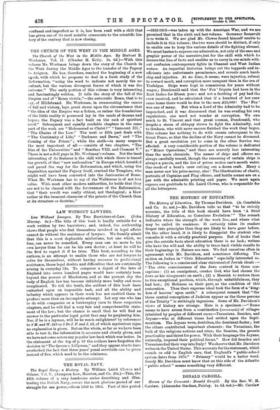THE ROYAL NAVY.
The Royal Navy: a History. By William Laird Clowea and Others. Vol. V. (Sampson Low, Marston, and Co. 25s.)—This, the fifth volume of a very handsome series describing and illus- trating the British Navy, covers the most glorious period of our struggle for sea power,—from 1803 to 1815. Part of this period —1812-1816—was taken up with the American War, and we are promised that in the sixth and last volume. Governor Roosevelt is to write it. We are glad Mr. Clowes found himself unable to include it in this volume; the two wars should be distinct, if only to enable one to keep the various details of the fighting abreast. We must hasten to express our admiration, not only of the ease and graphic power of the narrative,but for the skill with which he dresses the line of facts and enables us to carry in our minds with- out confusion contemporary fights in Channel and West Indian waters. An impartial historian brings out the laggards and in- efficients into unfortunate prominence, and reveals much hard- ship and injustice. At no time, it seems, were injustice, refusal to reward merit, and corruption more rampant than in the era of Trafalgar. Ships were kept in commission for years without wages ; Dundonald said that the 'Fox' frigate had been in the East Indies for fifteen years and not a farthing of pay had the crew received, and he calculated that if a hundred of her crew came home there would be due to the men 425,000! The • Fox' was one of many. But when a Lord of the Admiralty had to be impeached, and it was discovered that he was evading his own regulations, one need not wonder at corruption. We owe much to St. Vincent and that great seaman, Dundonald, who despite a storm of obloquy strove to fight the Admiralty, and to Graham, who with more success finished the work they began. This volume has nothing to do with events subsequent to the Great Peace, so that the decline of the Navy cannot be discussed. But a great revolution yet to come in the other Service was effected. A very considerable portion of the volume is dedicated to "Minor Operations," and these are scarcely less interesting than the main chronicle. The names of ships and officers are always carefully traced, though the renaming of certain ships is always a puzzle, and the list of prizes makes one's month water. One reads of a boat's crew cutting out a dozen craft. Many a man never saw his prize-money, alas ! The illustrations of charts, portraits of Captains and Flag officers, and battle scenes are on a par with the admirable printing and paper. We must again express our gratitude to Mr. Laird Clowes, who is responsible for all the letterpress.


















































 Previous page
Previous page